General Sir John Monash, Personal Files Book 23, 24 September - 26 December 1919, Part 3
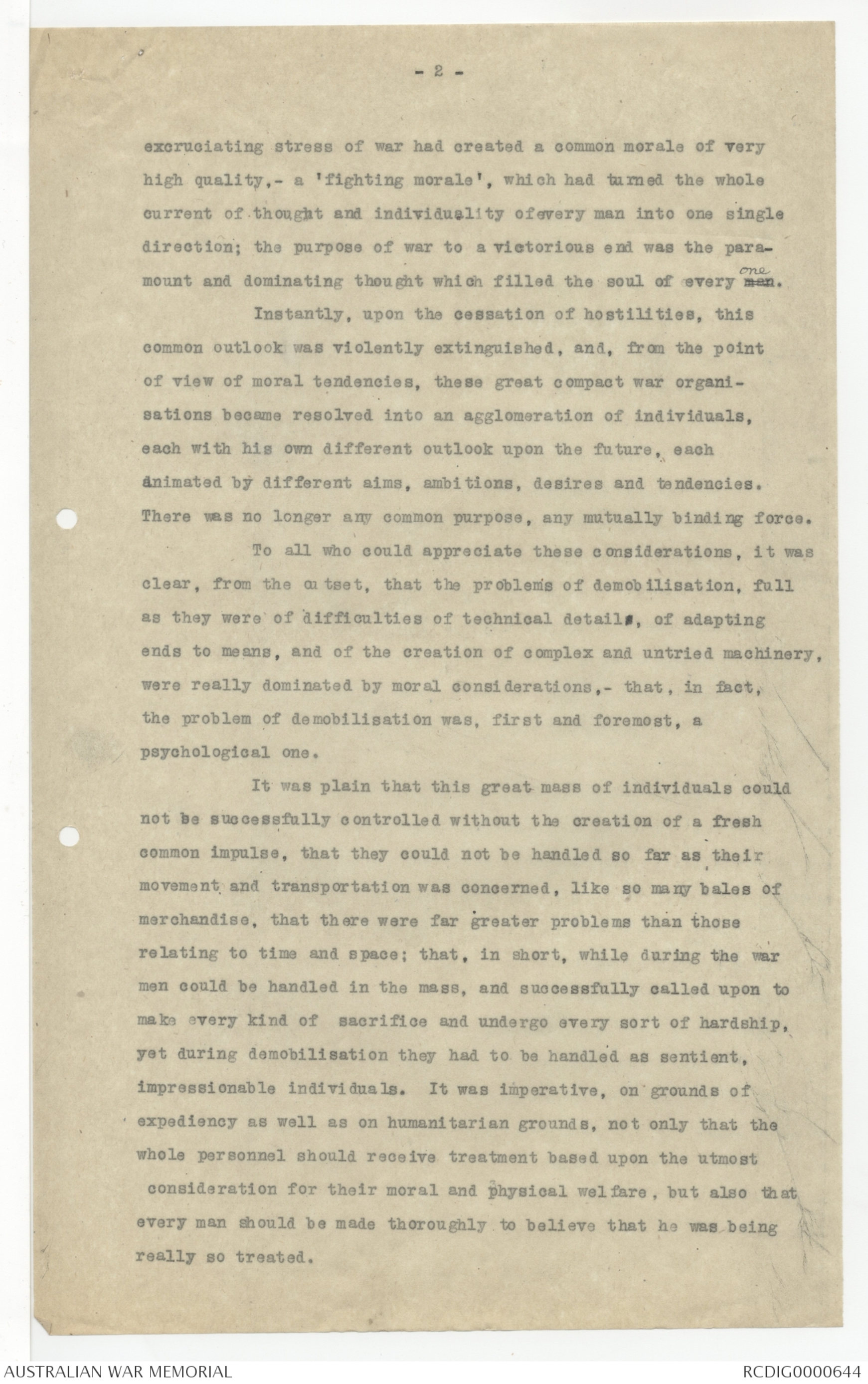
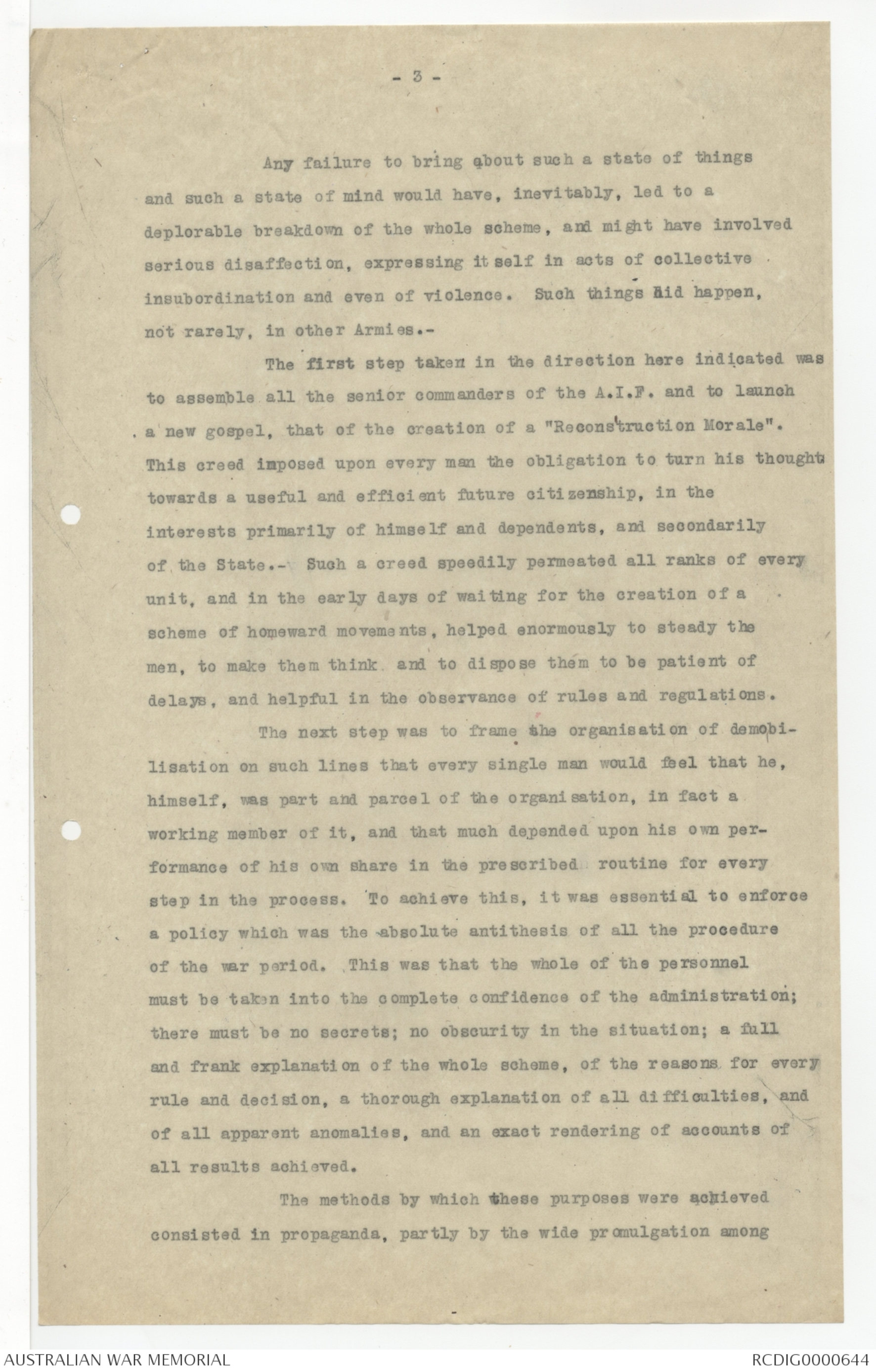
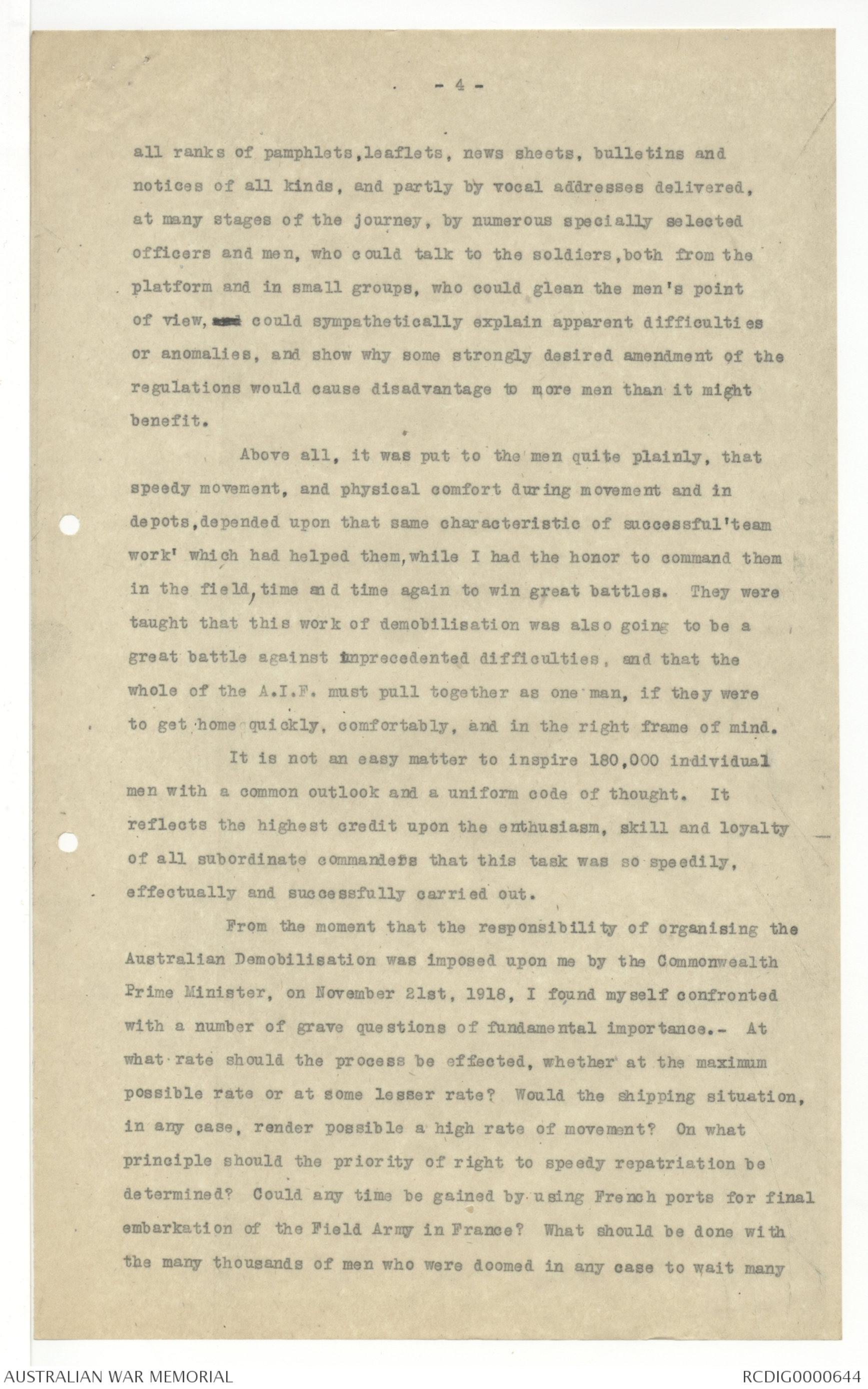
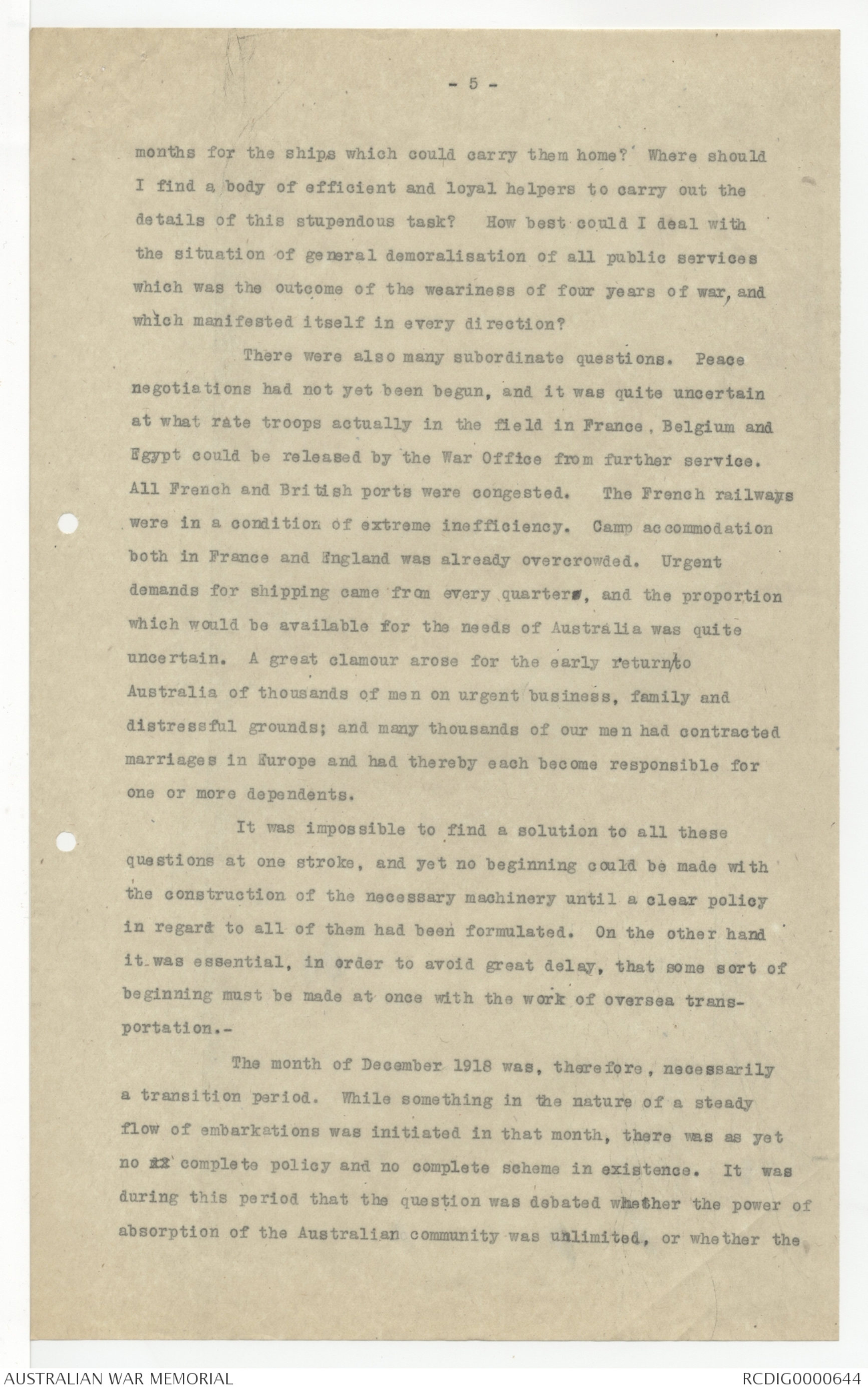
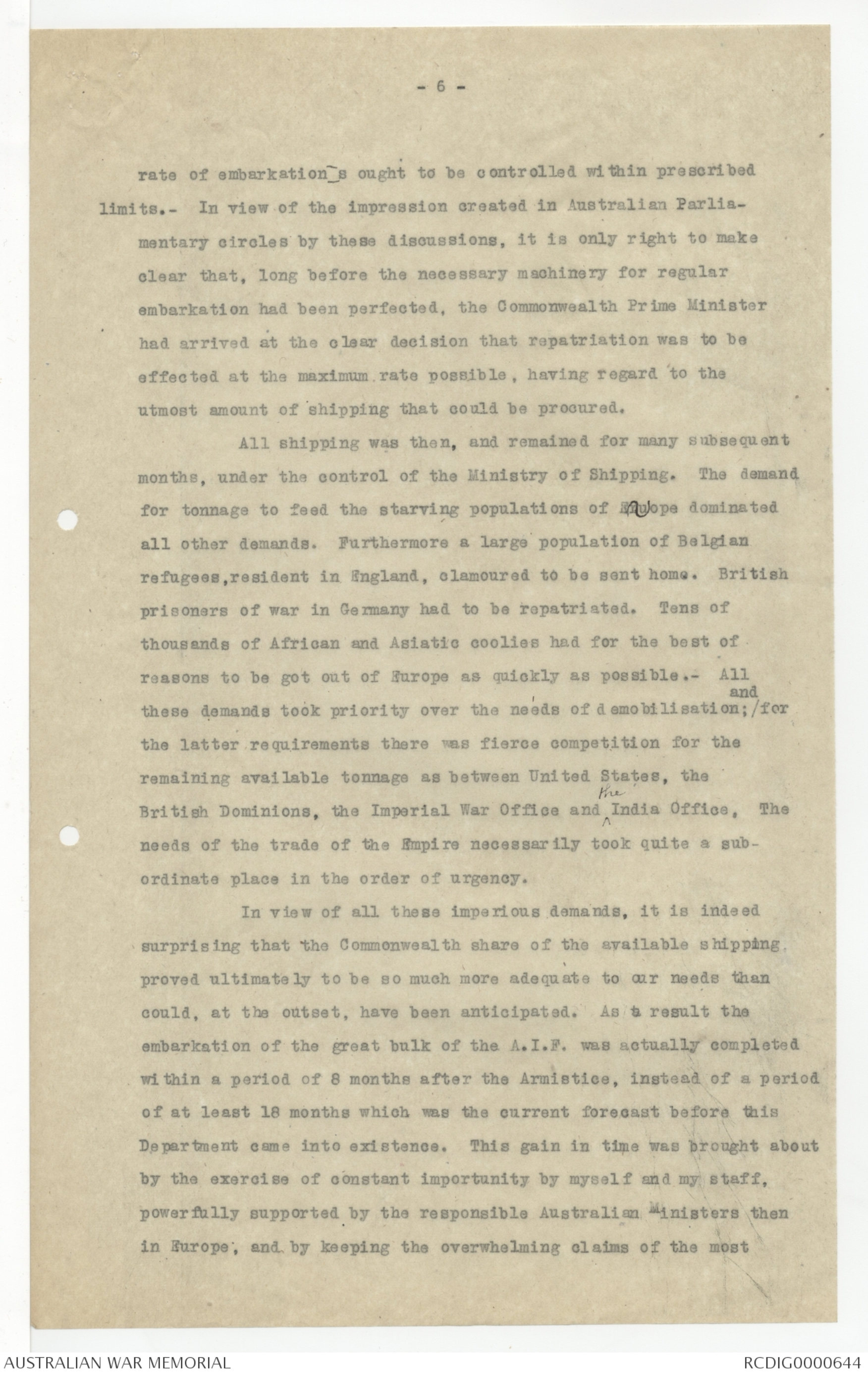
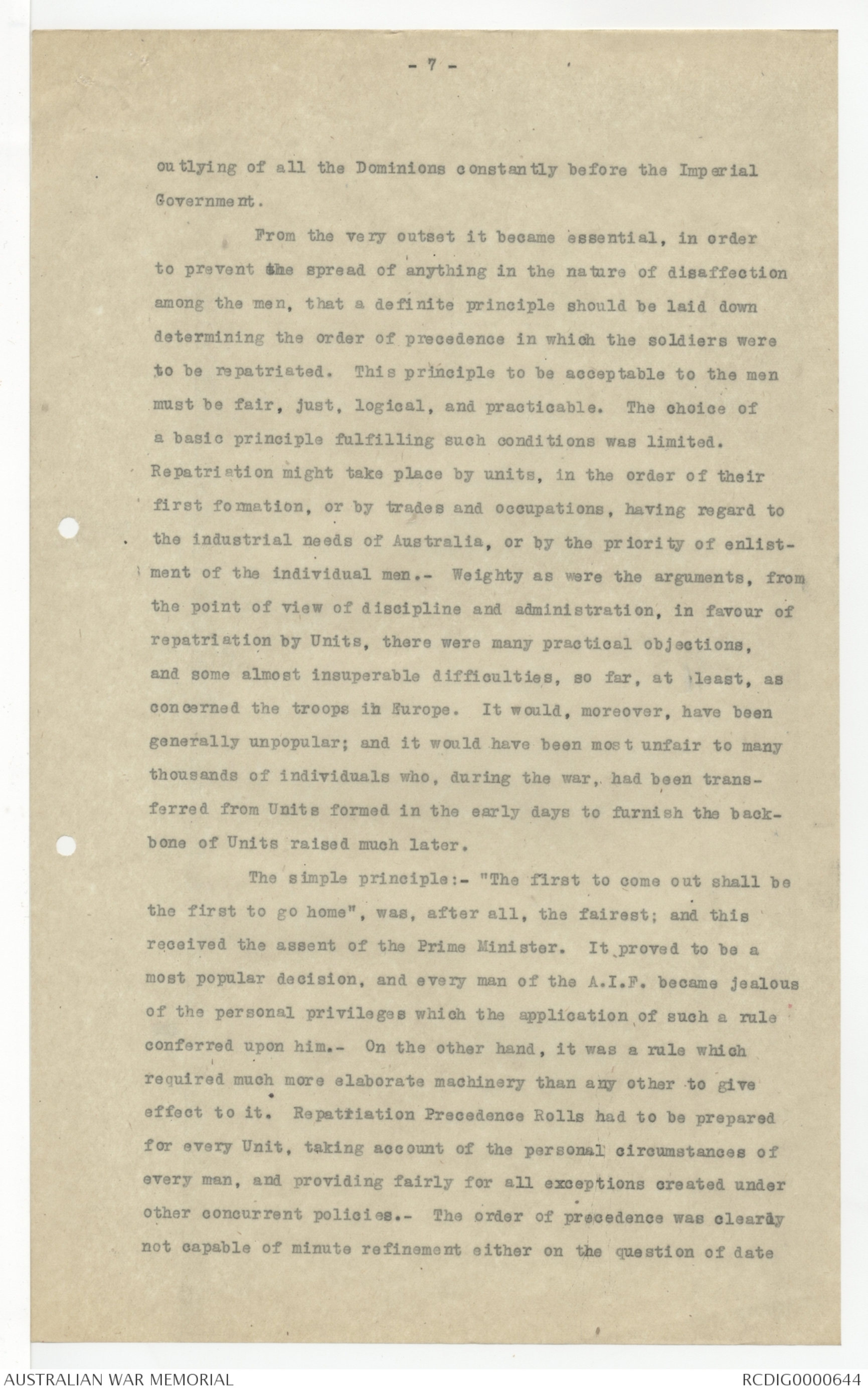
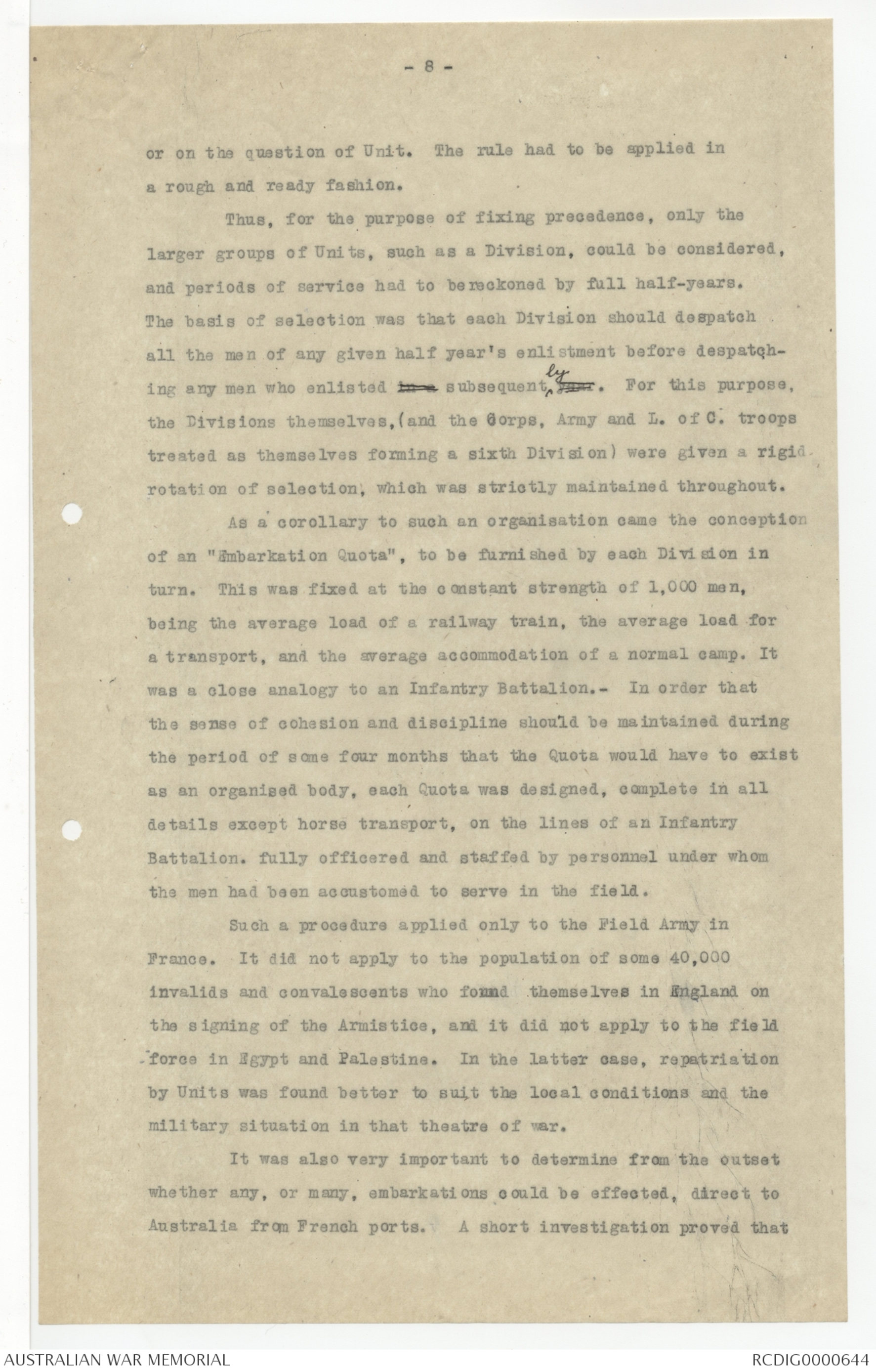
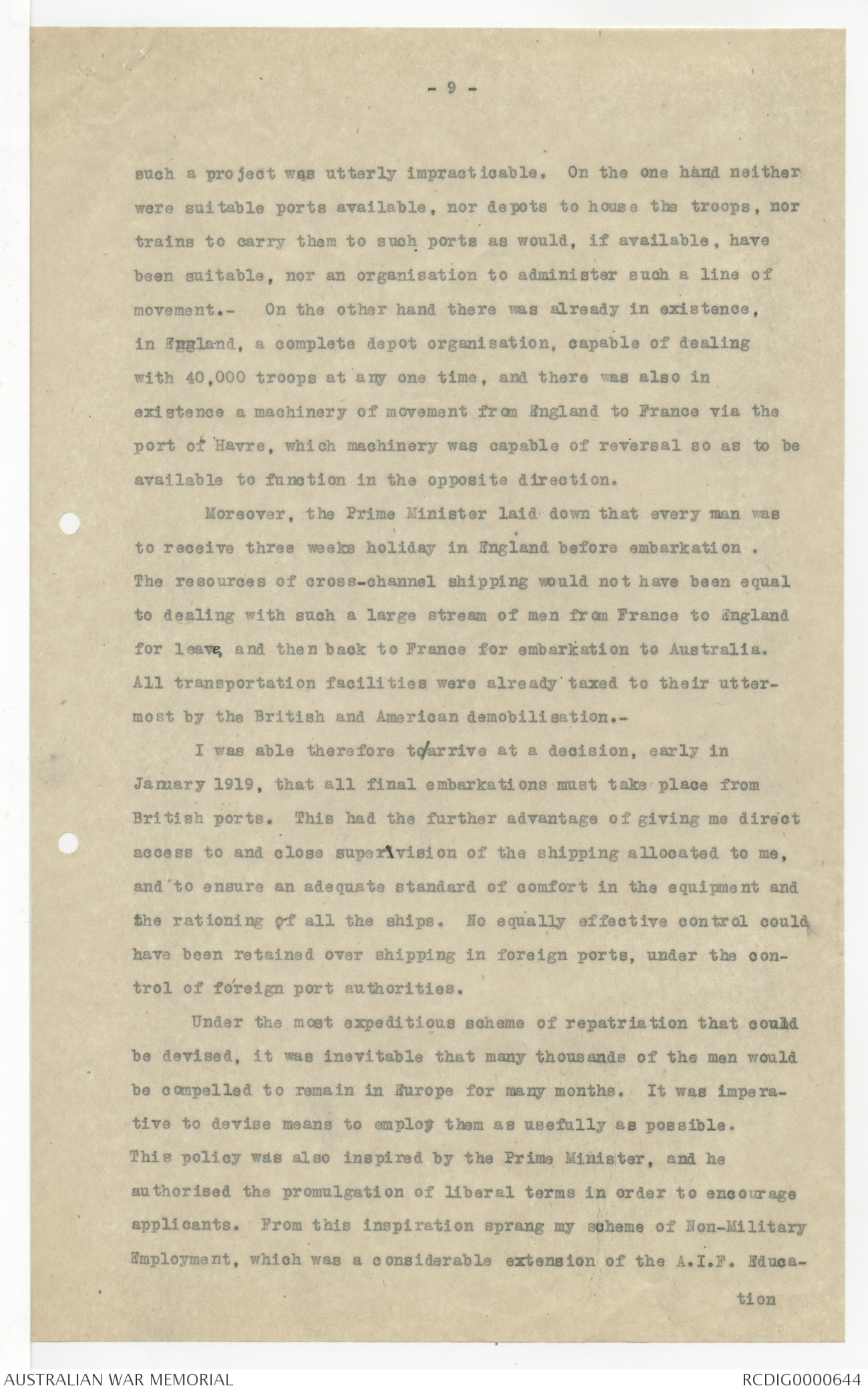
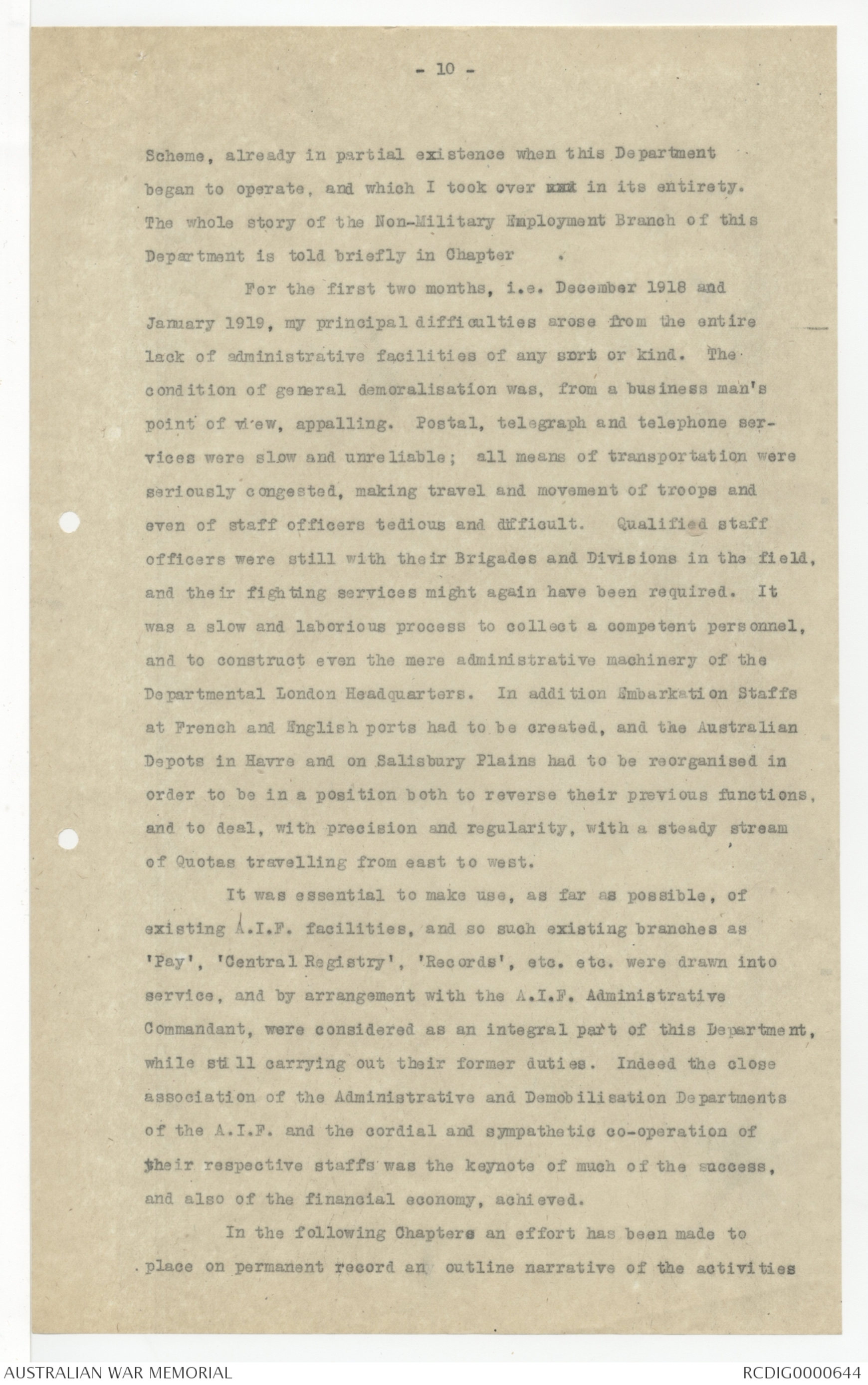
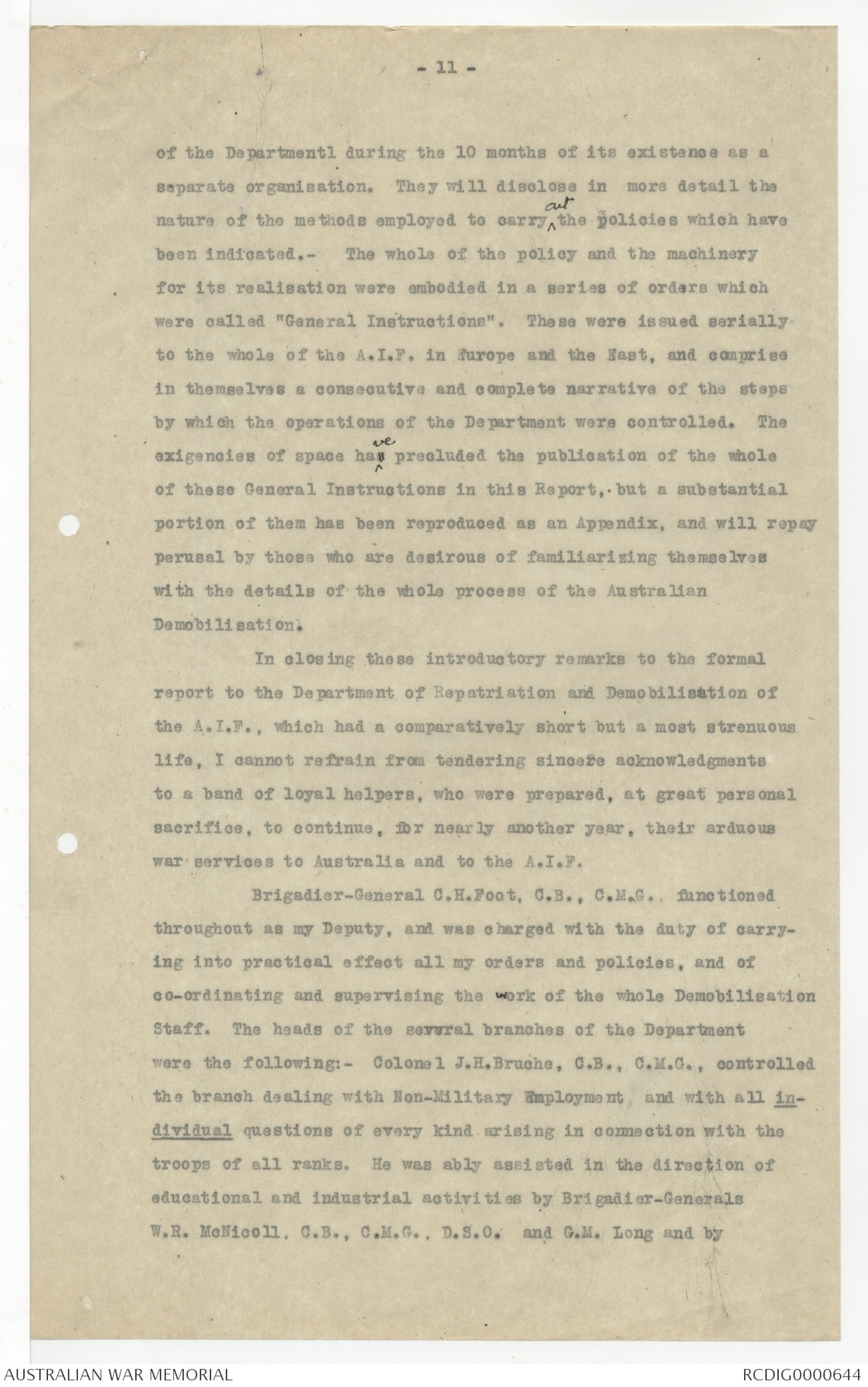
-2 -
excruciating stress of war had created a common morale of very
high quality,- a 'fighting morale', which had turned the whole
current of thought and individuality of every man into one single
direction; the purpose of war to a viecorious end was the paramount
and dominating thought which filled the soul of every man one.
Instantly, upon the cessation of hostilities, this
common outlook was violently extinguished, and, from the point
of view of moral tendencies, these great compact war organisations
became resolved into an agglomeration of individuals,
each with his own different outlook upon the future, each
animated by different aims, ambitions, desires and tendencies.
There was no longer any common purpose, any mutually binding force.
To all who could appreciate these considerations, it was
clear, from the outset, that the problems of demobilisation, full
as they were of difficulties of technical details, of adapting
ends to means, and of the creation of complex and untried machinery,
were really dominated by moral considerations,- that, in fact,
the problem of demobilisation was, first and foremost, a
psychological one.
It was plain that this great mass of individuals could
not be successfully controlled without the creation of a fresh
common impulse, that they could not be handled so far as their
movement and transportation was concerned, like so many bales of
merchandise, that there were far greater problems than those
relating to time and space: that, in short, while during the war
men could be handled in the mass, and successfully called upon to
make every kind of sacrifice and undergo every sort of hardship,
yet during demobilisation they had to be handled as sentient,
impressionable individuals. It was imperative, on grounds of
expediency as well as on humanitarian grounds, not only that the
whole personnel should receive treatment based upon the utmost
consideration for their moral and physical welfare, but also that
every man should be made thoroughly to believe that he was being
really so treated.
-3-
Any failure to bring about such a state of things
and such a state of mind would have, inevitably, led to a
deplorable breakdown of the whole scheme, and might have involved
serious disaffection, expressing itself in acts of collective
insubordination and even of violence. Such things did happen,
not rarely, in other Armies.-
The first step taken in the direction here indicated was
to assemble all the senior commanders of the A.I.F. and to launch
a new gospel, that of the creation of a "Reconstruction Morale".
This creed imposed upon every man the obligation to turn his thought
towards a useful and efficient future citizenship, in the
interests primarily of himself and dependents, and secondarily
of the State.- Such a creed speedily permeated all ranks of every
unit, and in the early days of waiting for the creation of a
scheme of homeward movements, helped enormously to steady the
men, to make them think, and to dispose them to be patient of
delays, and helpful in the observance of rules and regulations.
The next step was to frame the organisation of demobilisation
on such lines that every single man would feel that he,
himself, was part and parcel of the organisation, in fact a
working member of it, and that much depended upon his own performance
of his own share in the prescribed routine for every
step in the process. To achieve this, it was essential to enforce
a policy which was the absolute antithesis of all the procedure
of the war period. This was that the whole of the personnel
must be taken into the complete confidence of the administration;
there must be no secrets; no obscurity in the situation; a full
and frank explanation of the whole scheme, of the reasons for every
rule and decision, a thorough explanation of all difficulties, and
of all apparent anomalies, and an exact rendering of accounts of
all results achieved.
The methods by which these purposes were achieved
consisted in propaganda, partly by the wide promulgation among
- 4 -
all ranks of pamphlets,leaflets, news sheets, bulletins and
notices of all kinds, and partly by vocal addresses delivered,
at many stages of the journey, by numerous specially selected
officers and men, who could talk to the soldiers, both from the
platform and in small groups, who could glean the men's point
of view, and could sympathetically explain apparent difficulties
or anomalies, and show why some strongly desired amendment of the
regulations would cause disadvantage to more men than it might
benefit.
Above all, it was put to the men quite plainly, that
speedy movement, and physical comfort during movement and in
depots,depended upon that same characteristic of successful 'team
work' which had helped them, while I had the honor to command them
in the field, time and time again to win great battles. They were
taught that this work of demobilisation was also going to be a
great battle against unprecedented difficulties, and that the
whole of the A.I.F. must pull together as one man, if they were
to get home quickly, comfortably, and in the right frame of mind.
It is not an easy matter to inspire 180,000 individual
men with a common outlook and a uniform code of thought. It
reflects the highest credit upon the enthusiasm, skill and loyalty
of all subordinate commanders that this task was so speedily,
effectually and successfully carried out.
From the moment that the responsibility of organising the
Australian Demobilisation was imposed upon me by the Commonwealth
Prime Minister, on November 21st, 1918, I found myself confronted
with a number of grave questions of fundamental importance.- At
what rate should the process be effected, whether at the maximum
possible rate or at some lesser rate? Would the shipping situation,
in any case, render possible a high rate of movement? On what
principle should the priority of right to speedy repatriation be
determined? Could any time be gained by using French ports for final
embarkation of the Field Army in France? What should be done with
the many thousands of men who were doomed in any ease to wait many
- 5 -
months for the ships which could carry them home?' Where should
I find a body of efficient and loyal helpers to carry out the
details of this stupendous task? How best could I deal with
the situation of general demoralisation of all public services
which was the outcome of the weariness of four years of war, and
which manifested itself in every direction?
There were also many subordinate questions. Peace
negotiations had not yet been begun, and it was quite uncertain
at what rate troops actually in the field in France, Belgium and
Egypt could be released by the War Office from further service.
All French and British ports were congested. The French railways
were in a condition of extreme inefficiency. Camp accommodation
both in France and England was already overcrowded. Urgent
demands for shipping came from every quarters, and the proportion
which would be available for the needs of Australia was quite
uncertain. A great clamour arose for the early return/to
Australia of thousands of men on urgent business, family and
distressful grounds; and many thousands of our men had contracted
marriages in Europe and had thereby each become responsible for
one or more dependents.
It was impossible to find a solution to all these
questions at one stroke, and yet no beginning could be made with
the construction of the necessary machinery until a clear policy
in regard to all of them had been formulated. On the other hand
it was essential, in order to avoid great delay, that some sort of
beginning must be made at once with the work of oversea transportation.-
The month of December 1918 was, therefore, necessarily
a transition period. While something in the nature of a steady
flow of embarkations was initiated in that month, there was as yet
no complete policy and no complete scheme in existence. It was
during this period that the question was debated whether the power of
absorption of the Australian community was unlimited, or whether the
- 6 -
rate of embarkations ought to be controlled within prescribed
limits.- In view of the impression created in Australian Parliamentary
circles by these discussions, it is only right to make
clear that, long before the necessary machinery for regular
embarkation had been perfected, the Commonwealth Prime Minister
had arrived at the clear decision that repatriation was to be
effected at the maximum rate possible, having regard to the
utmost amount of shipping that could be procured.
All shipping was then, and remained for many subsequent
months, under the control of the Ministry of Shipping. The demand
for tonnage to feed the starving populations of Europe dominated
all other demands. Furthermore a large population of Belgian
refugees, resident in England, clamoured to be sent home. British
prisoners of war in Germany had to be repatriated. Tens of
thousands of African and Asiatic coolies had for the best of
reasons to be got out of Europe as quickly as possible.- All
these demands took priority over the needs of demobilisation; ^and for
the latter requirements there was fierce competition for the
remaining available tonnage as between United States, the
British Dominions, the Imperial War Office and ^the India Office, The
needs of the trade of the Empire necessarily took quite a subordinate
place in the order of urgency.
In view of all these imperious demands, it is indeed
surprising that the Commonwealth share of the available shipping
proved ultimately to be so much more adequate to our needs than
could, at the outset, have been anticipated. As a result the
embarkation of the great bulk of the A.I.F. was actually completed
within a period of 8 months after the Armistice, instead of a period
of at least 18 months which was the current forecast before this
Department came into existence. This gain in time was brought about
by the exercise of constant importunity by myself and my staff.
powerfully supported by the responsible Australian Ministers then
in Europe, and by keeping the overwhelming claims of the most
- 7 -
outlying of all the Dominions constantly before the Imperial
Government.
From the very outset it became essential, in order
to prevent the spread of anything in the nature of disaffection
among the men, that a definite principle should be laid down
determining the order of precedence in which the soldiers were
to be repatriated. This principle to be acceptable to the men
must be fair, just, logical, and practicable. The choice of
a basic principle fulfilling such conditions was limited.
Repatriation might take place by units, in the order of their
first formation, or by trades and occupations, having regard to
the industrial needs of Australia, or by the priority of enlistment
of the individual men.- Weighty as were the arguments, from
the point of view of discipline and administration, in favour of
repatriation by Units, there were many practical objections,
and some almost insuperable difficulties, so far, at least, as
concerned the troops in Europe. It would, moreover, have been
generally unpopular; and it would have been most unfair to many
thousands of individuals who, during the war, had been transferred
from Units formed in the early days to furnish the back-bone
of Units raised much later.
The simple principle:- "The first to come out shall be
the first to go home", was, after all, the fairest; and this
received the assent of the Prime Minister. It proved to be a
most popular decision, and every man of the A.I.F. became jealous
of the personal privileges which the application of such a rule
conferred upon him.- On the other hand, it was a rule which
required much more elaborate machinery than any other to give
effect to it. Repatriation Precedence Rolls had to be prepared
for every Unit, taking account of the personal circumstances of
every man, and providing fairly for all exceptions created under
other concurrent policies.- The order of precedence was clearly
not capable of minute refinement either on the question of date
- 8 -
or on the question of Unit. The rule had to be applied in
a rough and ready fashion.
Thus, for the purpose of fixing precedence, only the
larger groups of Units, such as a Division, could be considered,
and periods of service had to be reckoned by full half-years.
The basis of selection was that each Division should despatch
all the men of any given half year's enlistment before despatching
any men who enlisted in a subsequent^ly year. For this purpose,
the Divisions themselves ,(and the Corps, Army and L. of C. troops
treated as themselves forming a sixth Division) were given a rigid
rotation of selection, which was strictly maintained throughout.
As a corollary to such an organisation came the conception
of an "Embarkation Quota", to be furnished by each Division in
turn. This was fixed at the constant strength of 1,000 men,
being the average load of a railway train, the average load for
a transport, and the average accommodation of a normal camp. It
was a close analogy to an Infantry Battalion.- In order that
the sense of cohesion and discipline should be maintained during
the period of some four months that the Quota would have to exist
as an organised body, each Quota was designed, complete in all
details except horse transport, on the lines of an Infantry
Battalion. fully officered and staffed by personnel under whom
the men had been accustomed to serve in the field.
Such a procedure applied only to the Field Army in
France. It did not apply to the population of some 40,000
invalids and convalescents who found themselves in England on
the signing of the Armistice, and it did not apply to the field
force in Egypt and Palestine. In the latter case, repatriation
by Units was found better to suit the local conditions and the
military situation in that theatre of war.
It was also very important to determine from the outset
whether any, or many, embarkations could be affected, direct to
Australia from French ports. A short investigation proved that
- 9 -
such a project was utterly impracticable. On the one hand neither
were suitable ports available, nor depots to house the troops, nor
trains to carry them to such ports as would, if available, have
been suitable, nor an organisation to administer such a line of
movement.- On the other hand there was already in existence,
in England, a complete depot organisation, capable of dealing
with 40,000 troops at any one time, and there was also in
existence a machinery of movement from England to France via the
port of Havre, which machinery was capable of reversal so as to be
available to function in the opposite direction.
Moreover, the Prime Minister laid down that every man was
to receive three weeks holiday in England before embarkation.
The resources of cross-channel shipping would not have been equal
to dealing with such a large stream of men from France to England
for leave, and then back to France for embarkation to Australia.
All transportation facilities were already taxed to their uttermost
by the British and American demobilisation.-
I was able therefore to/arrive at a decision, early in
January 1919, that all final embarkations must take place from
British ports. This had the further advantage of giving me direct
access to and close supervision of the shipping allocated to me,
and to ensure an adequate standard of comfort in the equipment and
the rationing of all the ships. No equally effective control could
have been retained over shipping in foreign ports, under the control
of foreign port authorities.
Under the most expeditious scheme of repatriation that could
be devised, it was inevitable that many thousands of the men would
be compelled to remain in Europe for many months. It was imperative
to devise means to employ them as usefully as possible.
This policy was also inspired by the Prime Minister, and he
authorised the promulgation of liberal terms in order to encourage
applicants. From this inspiration sprang my scheme of Non-Military
Employment, which was a considerable extension of the A.I.F. Education
- 10 -
Scheme, already in partial existence when this Department
began to operate, and which I took over xxx in its entirety.
The whole story of the Non-Military Employment Branch of this
Department is told briefly in Chapter .
For the first two months, i.e. December 1918 and
January 1919, my principal difficulties arose from the entire
lack of administrative facilities of any sort or kind. The
condition of general demoralisation was, from a business man's
point of view, appalling. Postal, telegraph and telephone services
were slow and unreliable; all means of transportation were
seriously congested, making travel and movement of troops and
even of staff officers tedious and difficult. Qualified staff
officers were still with their Brigades and Divisions in the field,
and their fighting services might again have been required. It
was a slow and laborious process to collect a competent personnel,
and to construct even the mere administrative machinery of the
Departmental London Headquarters. In addition Embarkation Staffs
at French and English ports had to be created, and the Australian
Depots in Havre and on Salisbury Plains had to be reorganised in
order to be in a position both to reverse their previous functions,
and to deal, with precision and regularity, with a steady stream
of Quotas travelling from east to west.
It was essential to make use, as far as possible, of
existing A.I.F. facilities, and so such existing branches as
'Pay', 'Central Registry', 'Records', etc. etc. were drawn into
service, and by arrangement with the A.I.F. Administrative
Commandant, were considered as an integral part of this Department,
while still carrying out their former duties. Indeed the close
association of the Administrative and Demobilisation Departments
of the A.I.F. and the cordial and sympathetic co-operation of
their respective staffs was the keynote of much of the success.
and also of the financial economy, achieved.
In the following Chapters an effort has been made to
place on permanent record an outline narrative of the activities
- 11 -
of the Departmentl during the 10 months of its existence as a
separate organisation. They will disclose in more detail the
nature of the methods employed to carry ^out the policies which have
been indicated.- The whole of the policy and the machinery
for its realisation were embodied in a series of orders which
were called "General Instructions". These were issued serially
to the whole of the A.I.F. in Europe and the East, and comprise
in themselves a consecutive and complete narrative of the steps
by which the operations of the Department were controlled. The
exigencies of space has^ve precluded the publication of the whole
of these General Instructions in this Report, but a substantial
portion of them has been reproduced as an Appendix, and will repay
perusal by those who are desirous of familiarizing themselves
with the details of the whole process of the Australian
Demobilisation).
In closing these introductory remarks to the formal
report to the Department of Repatriation and Demobilisation of
the A.I.F., which had a comparatively short but a most strenuous
life, I cannot refrain from tendering sincere acknowledgments
to a band of loyal helpers, who were prepared, at great personal
sacrifice, to continue, for nearly another year, their arduous
war services to Australia and to the A.I.F.
Brigadier-General C.H.Foot, C.B., C.M.G., functioned
throughout as my Deputy, and was charged with the duty of carrying
into practical effect all my orders and policies, and of
co-ordinating and supervising the work of the whole Demobilisation
Staff. The heads of the several branches of the Department
were the following:- Colonel J.H.Bruche, C.B., C.M.G., controlled
the branch dealing with Non-Military Employment, and with all individual
questions of every kind arising in connection with the
troops of all ranks. He was ably assisted in the direction of
educational and industrial activities by Brigadier-Generals
W.R. McNicoll, C.B., C.M.G.. D.S.O. and G.M. Long and by
 Sam scott
Sam scottThis transcription item is now locked to you for editing. To release the lock either Save your changes or Cancel.
This lock will be automatically released after 60 minutes of inactivity.